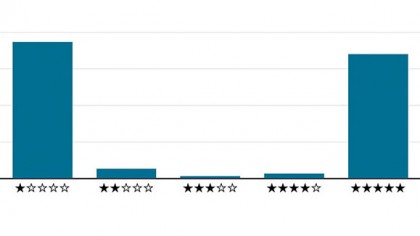The only thing crowd-sourced ratings tell us is that people are jerks
Public opinion will always run to extremes

Sign up for breaking news, reviews, opinion, top tech deals, and more.
You are now subscribed
Your newsletter sign-up was successful
The internet - and please take a moment to look around you and consciously record the world as it is now because in 41 words' time I'm going to rock it to its very core with a pronouncement of such devastating originality and novelty that it might be hard in years to come to remember just what the world was like before you heard it - is a place of extremes. Everything is either awesome, or it sucks.
Not on TechRadar, of course. Here we're all about the nuance and the subtlety and not at all about the writing of provocative opinion pieces.
Going to extremes
Anyway, what I wanted to say was: star ratings based on public reviews are meaningless and a waste of everyone's time. Human nature being what it is means that the distribution of star ratings when the public can set them looks a bit like this:

And that's because if you can be bothered to review something, it's because you've been galvanised by thinking it's either the greatest thing since sliced bread or the worst thing since Nazism; by definition, nobody gets fired up to write a three-star review. Meh begets meh, and since rage cancels out joy when you take an average, star ratings don't really tell you much.
Their intent is laudable, to be sure: to give you a sense of how good something is. You could argue (as I often rhetorically did when I was an editor) that you should scrap all gradations and just give everything a thumbs-up or thumbs-down rating - which is not unlike the 1-or-5-stars position. If you don't adopt that, though, you're just talking about shades of grey in your shades of grey.
Do you mark out of five stars, do you allow half-stars, do you express it as a percentage (as if anyone can seriously argue there's a substantive objective difference between a game getting 84% and 85%), do you break it down into sub-categories and derive the overall rating from that?
But arbitrary as they are, star ratings given by experienced experts can allow a buying public to differentiate between appalling, unexceptional and superb at a glance. Star ratings voted by the public and arrived at by an algorithm that might be no more sophisticated than a mean average can be a mushy, indistinct mess that helps nobody.
Sign up for breaking news, reviews, opinion, top tech deals, and more.
A mark of spite
This week, ustwo released an update to Monument Valley, a game which has been universally adored by reviewers to the extent that it's essentially become a shorthand for utterly lovely and beautifully crafted gaming experiences. It cost £2.49 when it was first introduced, and this week's update adds a collection of new chapters – an expansion pack, basically – for which the developers quite reasonably charged £1.49. Predictably, what happened next is that a lot of entitled babies – who apparently either have no idea how much work goes into creating things or don't care whether their creators can support themselves and their families – hied themselves to the App Store to rate the game one star and mash the keyboard for a bit to express their disgust, thus dragging down the average rating.
So for a while – until ustwo gently though exasperatedly pointed out the injustice on Twitter, prompting fans of quality and of developers being able to eat to counteract with a deluge of five-star reviews – if you'd been a regular punter browsing the Store for something fun to play, you would have gotten the impression from glancing at its rating that Monument Valley was a poor game rather than one of the most critically acclaimed games of the last couple of years.
The fault isn't really with the system, though, but with people. How else can you explain the 4.9/5 rating the first picture the Philae lander sent back from the surface of comet 67P currently has? What kind of towering arsehole looks at that picture – a picture taken 316 million miles away by a probe we launched 10 years ago and which landed on an object travelling at more than 30,000mph – and rates it anything other than five stars?
Star ratings don't really tell you much, then, except that people can be jerks. And we didn't really need star ratings to tell us that.